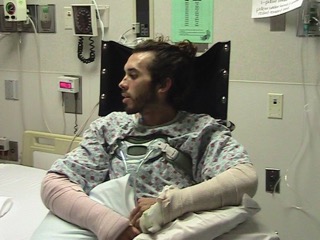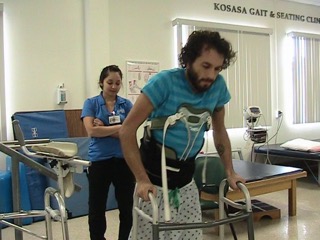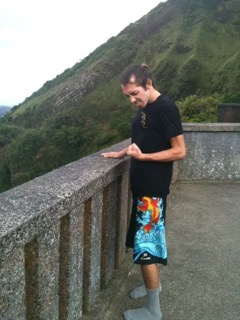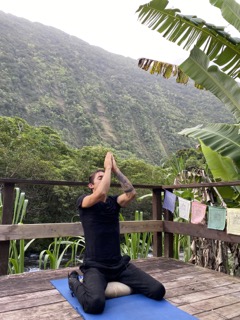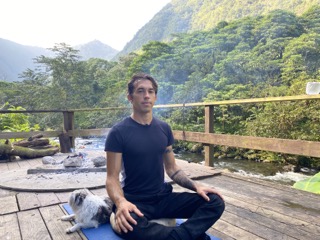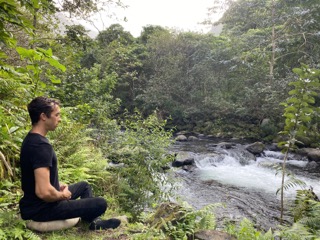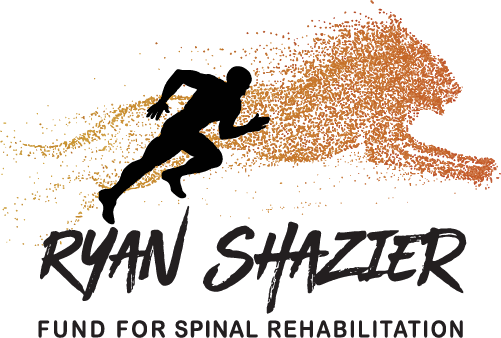by Cathy Cuff-Coffman
“To love myself has been one of the most profound gifts of this injury. When I love myself as whole, healed, and human, something unbreakable arises—something that can never be taken, shaken, or stirred, and at that moment, I am healed.”
–Dustin G. Meza, “Paralysis Assassin: Healing With Ancient Warrior Wisdom”
The most recent data from The National Spinal Cord Injury Statistical Center (2023) says the annual incidence of traumatic spinal cord injury (SCI) is approximately 54 cases per one million people in the United States.
This equals about 18,000 new traumatic SCI cases each year, or 0.05% of the US’s 333.3 million citizens—not exactly a rich sampling size.
However, the SCI population is as rich and varied as the United States, with thoughts about and approaches to the injury on a wide continuum.
But it comes as more than a surprise when Hawaii resident Dustin Meza, who’s living with a spinal cord injury, declares:
“A spinal cord injury is not unlike a spiritual journey.”
“So few of us get this injury,” he continues, “and so few are given an opportunity to become much more than who we were before this happened to us. I look at [this injury] as an opportunity for my spirit to evolve.”
Way Up High…In a Coconut Tree
Meza, now 38, was 26 when he was hurt in January 2012. Meza was working at a camp in Hawaii and was tasked with harvesting coconuts,
“I’d done it 1,000 times before,” he reminisces. “And once you’re up there, it’s pretty comfortable.” He notes that even with a wind, the leaves and branches in a coconut tree form a crown. “It’s very sturdy, like a crow’s nest on a sailboat.”
Meza says he was tying his safety rope off, “and I got this premonition that life was about to change very quickly. The next thing I know, I’m falling 30 feet out of the sky.”
The next few hours were a whirlwind. Once the medics came, Meza was taken over the mountain via helicopter to a hospital. But once he was assessed, it was evident his injuries were beyond what that facility could handle.
He was stabilized and then flown in a jet over to Queens Hospital in Honolulu, about 150 miles away, where he had spinal surgery.
“And that is where I stayed for 30 days in kind of like an ICU, getting stable,” says Meza. “Then, after that, I was moved for another 30 days to Rehab of the Pacific.”
This is Paralysis
Meza’s vertebrae were broken at thoracic (T) T4, T10, T11, and T12. “They were shattered, and my spinal cord was crushed along with it,” says Meza.
He relates that after surgery, he realized the extent of his condition. “Everything from the navel down was affected–Bowel, bladder, sexual function, touch sensation, movement, everything below the waist.”
Meza takes a deep breath. “And, and it just hits you like a freight train. You’re like, holy $#(+. This is what paralysis is.”
Meza left the glaring, noisy rehab hospital and returned to his makeshift home. “I was living three miles deep into a jungle where there’s no TV, almost no electrical except for solar power, which powers Christmas lights that you get at Costco,” he explains. “And those last until maybe 9:30 at night.”
His water was piped up from the river to a storage tank and then accessed via a gravity-fed filtration system.
“I was completely off the grid, living with no distractions of cell phones or the internet,” he says, contrasting that to the perceived chaos of the hospital-based rehab.
Meza also opines that with all the “perceived losses that spinal cord injury inflicted upon me, my feelings of inadequacy expanded, and it was often hard to know what to do to relieve the symptoms in my body and my mind.”
The instruction packet he got from the hospital was more about living with a spinal cord injury than it was about healing from a spinal cord injury, he says. This didn’t fit within his goals of healing.
Meza, hurt, dealing with paralysis, and alone, felt as if he had hit rock bottom.
He turned inward toward and embraced what he calls, “Spirit.”.
A Rising Spirit
“As I am working on my own internal evolution, Spirit put me into this situation to assist my development of evolving, the opportunity for me to dive deeper into my being and get out of my body a little bit,” he theorizes out loud.
Being in the jungle, which, as an able-bodied young man, Meza traversed as easily as a rock wallaby. “So, I took that time in 2012 and on as a gift from God,” says Meza. “Yes, even my SCI. I focused on not being distracted and instead on what my body could do.”
But now, says Meza, he was also stuck. “I was forced to uncover all of these things that I’ve been neglecting, all the messages Spirit’s been trying to tell me, but I’ve was too distracted before my injury by the ability to go play and do whatever I wanted with my body.”
Meza says he started on a path of personal evolution. “And so for me, disability pride comes from the fact that I’m proud to be one of the few people on the planet that Spirit felt, ‘hey, you’re strong enough in spirit and character that you can take this on.’”
Back to Basics
It was then, alone in his makeshift apartment in the Hawai’ian jungle, when Dustin Meza became kind to himself and gave himself a little bit of grace.
Meza leaned into his knowledge of Chinese Martial Arts. “Fortunately, martial arts—as a method of rehabilitation and personal empowerment—has a rich history of practitioners who trained with various degrees of illness,” Meza points out. “Training with martial arts allowed me to tap into an integrated athleticism that was, and still is, undeniably helpful for my rehabilitation journey.”
His journey was rough, as he was practicing the healing of his spinal cord in conjunction with spiritual enlightenment. Meza chronicles the succession of benevolent teachers and masters within the martial arts and Chinese medicinal community who recognized his spiritual and physical hunger and fed him properly.
“For those people going through these serious spiritual evolutions, people don’t know,” he says. “All they may think is that you’re going through a dark time, and they can’t connect with that.”
But again, Meza revisits how proud he is a dozen years later. “I’m proud of what I’ve endured through this injury and that God chose me to represent what is possible after sustaining a spinal cord injury.”
“This process of evolution is far from over,” says Meza. “We still have work to do.”
Putting it Down for Others
For Meza, that work also manifests in giving back via his memoir, “Paralysis Assassin.”
Although he began writing the book in 2012, shortly after Meza was injured, it was published in the Spring of 2024. Why did it take 12 years to realize publication?
“Three months after I was injured, I realized I was doing something different than the standard program,” Meza says. “My philosophy is different because of my martial arts background, and I had a different way of approaching my training.”
As Meza trained with different Eastern Chinese teachers, he learned that he’s working with a different paradigm. “I want to introduce the idea that when you change the way you look at things, the things you look at change.”
In writing this book, Meza’s goal was to share the idea that an SCI isn’t a life sentence and that we can utilize other modalities, methodologies, and perspectives that mightn’t keep us feeling so trapped.
“I also had this sense or awareness that people in China are doing things very differently than we are here in America,” Meza adds. “I wanted to speak to that a little bit.”
Miracles Can Occur
Meza’s recovery from his SCI is remarkable. He theorizes, “It was my attachment to my past, to my pre-injury body, that was the thing that was keeping me from growing and evolving” when he first got injured in 2012.
“What I wanted to see was how this injury, this God-delivered injury, would assist me in getting exactly what I wanted and what my spirit was calling for,” he says. “If I wanted to learn how to be independent, grow up, and become an adult, how was this injury helping me become more of an adult?”
In other words, he says, if we are open to everything and attached to nothing, how is (any adversity) exactly what we need to become the person we were preparing ourselves to become?
“That detachment allowed me to be free of some of the hindrances many folks go through,” explains Meza. “It allowed me to pursue this injury and healing with tenacity.”
Meza also allowed even more faith to enter his life. “And the more faith I could allow myself to work with, the more I felt like, man, you can’t tell me that it’s not possible. You couldn’t convince me that miracles don’t happen.”
“If I take that perspective going into this injury,” he says, “then there’s no telling where this injury will leave me regarding my character development and spiritual evolution. It’s not the path I thought I was going to take,” Meza sighs. “but it’s still the path that needs to be taken.”
Book Review –Paralysis Assassin: Healing with Ancient Warrior Wisdom
Dustin Meza seamlessly combines his love and understanding of ancient Eastern medicine and philosophies with telling his own story of recovering from a devastating spinal cord injury.
The author’s personality shines through the pages: earnest, honest, fair, and with a few touches of humor.
The book is a tale of how the author finds himself paralyzed and almost alone, with a scant support system that he’s cobbled together.
Readers are privileged to be along for the journey as the author hits proverbial rock bottom. Then, through learning, acceptance, and the open-minded way of healing ways of various
Eastern teachers, he teaches himself how to live with and overcome the paralysis portion of his spinal cord injury. As the author heals, the book builds upon itself.
Shalieve
Wisdom
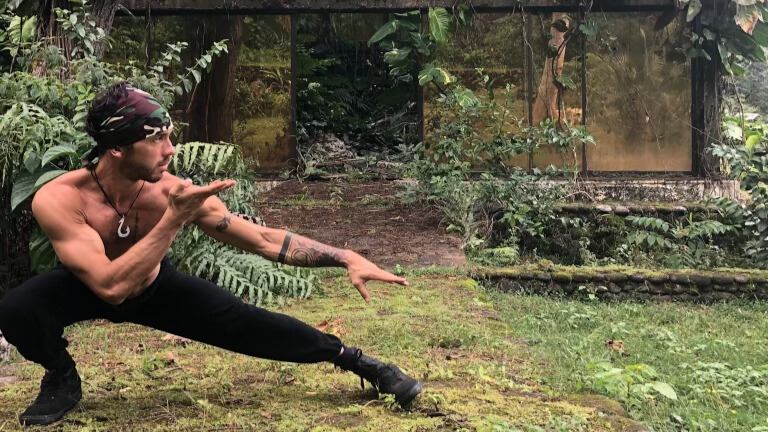
Dustin Meza's Shalieve Words of Wisdom
Find a strategic pathway. Taking a step back and setting your path with intention could help develop and prepare you for fighting a Goliath-like paralysis.
Honor the path God saw fit to put us on. Rest in that space. If I could honor the place God put me in, I'd not be fighting God; I'd not contest what the spirit is delivering. Instead, I'd be trying to harmonize.
Get the right medicine or treatment at the right time. Whether that is soaking in herbs, toning, or sifting through consciousness. A tiger has many tools at its disposal; it uses them accordingly.

